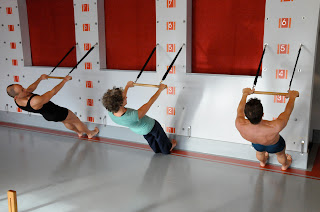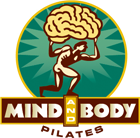 |
| A few Pilates Pullups. Strength exercise worthy of Crossfit. |
Jude and I went back to Crossfit Seattle today for the 1st time in a year and a half. We’ve been going to Crossfit 206 with Fran because it’s closer and 206 feels like our crossfit home. But I was reflecting on how long I have been doing Crossfit. I know I started at least in 2007 if not slightly before. Crossfit Seattle was then Crossfit North and was out in one of the hangars at Magnuson Park. It was definitely a funky space with a porta-potty outside.
I was only going 1x a week (maybe) and wasn’t sure about the intensity of the workout. Definitely an ass-kicker but I wasn’t sure if that was a good thing or not. But while I was not particularly regular Crossfit has definitely been in my thinking if not in my body for a good long time.
As a small person, I have always wanted to be and feel stronger. Crossfit definitely fills that for me. I didn’t really like weight training because it felt too segmented with too much muscle isolation. Crossfit is definitely a full form functional movement system although they have very little rotational work and a large percentage of the workout is in neutral spine (a good thing considering the heavy loads one is working with).
But I think one of the best things about Crossfit is their metrics or assessment tools. Everyone keeps a book or log of how much weight they are lifting on the various lifts: Back squat, Front Squat, Deadlift, Overhead Squat, etc. as well as their recording of the various set workouts. These workouts, as I have referred to before, are often named with womens names: Fran, Chelsea, Grace, Elizabeth, Helen, etc. Each workout has a proscribed weight to be used. Most of us will modify but we all know that we are working towards the Rx workout.
The ability to compare my ‘Cindy’ time (As Many Rounds As Possible (AMRAP) in 20 minutes of 5 pullups, 10 pushups and 15 squats) from a year ago or a couple of months ago and see how I have improved feels really great. (I think I have gone from 16 rounds to 21 rounds BTW). And then I can compare myself to others at my gym or any other Crossfit gym and see how ‘stack up’.
Pilates needs these assessment tools. We measure our progress by a. less pain in an injured area, b. better feeling in our body (very subjective) c. how we look in our clothes. But all of these are more or less subjective. I have tried to inject some assessments at our studio but we haven’t really continued to check in with them. I need to create more Pilates metrics. While we could use the classic ‘levels’, that doesn’t always work for everyone based on some injury. But in the next couple months, I am going to figure out some metrics that work very specifically for Pilates. I think so many of my clients have no idea how strong they have gotten. I need to take more pictures of my clients arms (mostly women) so they can see how sculpted and beautiful they have gotten. More importantly, how much more functional their fitness level is for their everyday lives when their gardening or lifting kids, traveling and having to lift carry ons in the stow bins. And strength in the gym will translate to less likely for injury elsewhere.

